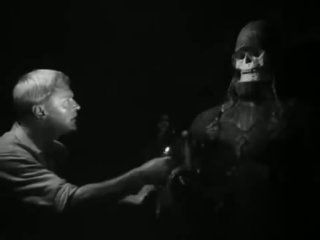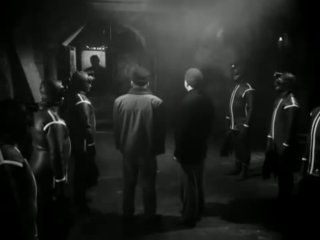He who possesses this weapon possesses the whole world.


The '60s Mabuse series had just about exhausted itself when it came time to make 1964's The Death Ray of Dr. Mabuse, the sixth and final entry. (For the time being I've had to skip over #5, 1963's Dr. Mabuse vs. Scotland Yard, because it was inexplicably left out of "The Dr. Mabuse Collection" as released by Retromedia, and I don't wish to pay $8.99 for Sinister Cinema's DVD-R just so I can watch it once.) Directed by Hugo Fregonese (who previously made the 1953 Jack the Ripper-inspired Man in the Attic starring Jack Palance), Death Ray deals with Mabuse's attempts to wrest control of Operation Archimedes away from Professor Larsen (O.E. Hasse), the reclusive scientist who's squirreled himself away on his own private island off the coast of Malta to work on it. Standing in Mabuse's way: Scotland Yard detective Major Bob Anders (Peter van Eyck, who played a different detective in vs. Scotland Yard the year before and was also in The 1000 Eyes), who's sent to Malta to look into the uptick in dead frogmen being brought in by the tide.
Before leaving jolly old England, though, Major Bob pays a visit to the asylum where Professor Pohland (Walter Rilla) -- first seen falling under Mabuse's power in The Testament and remaining in his grip in vs. Scotland Yard -- is locked up, just in time for Pohland to be threatened with some old-fashioned ECT (so he can be freed from Mabuse's hypnotic control) before being liberated (read: killed) by one of the villain's minions. This is Kaspar (krimi fixture Dieter Eppler), who's Mabuse's second-in-command and chief of his platoon of anonymous frogmen, who are seen trooping through a cemetery in their wetsuits (which isn't conspicuous at all) to receive instructions directly from their master (who appears to them inside a backlit confessional) on at least two occasions. For his part, Major Bob brings his ostensible girlfriend Judy (Rika Dialyna) with him to Malta as part of his cover, but she's mostly deadweight -- and infantilized deadweight to boot, even after she's installed in a brothel by his minders. (Don't ask; I won't tell.)
With Judy repeatedly throwing herself at Major Bob and getting nowhere with him, one might draw the conclusion that he's gay if not for the fact that he jumps into bed with Prof. Larsen's niece Gilda (Yvonne Furneaux), secretary to one of the contentious Monta brothers, who are paraded before us along with a number of other individuals we're led to believe may be Dr. Mabuse's current vessel. For starters, there's Larsen's assistant and occasional chess partner Dr. Krishna (Valéry Inkijinoff), who's described as "a specialist in hypnosis and mental telepathy." Then there's Larsen's other chess partner Mr. Botani (Claudio Gora), a museum curator whose secretary (Yôko Tani) attempts to seduce and kill Major Bob before she's eliminated herself. Heck, suspicion even falls on the major's own chief, Admiral Quency (Leo Genn), whose grotesque disfigurement compels him to stay out of the public eye, the perfect cover for a mastermind calling the shots for a criminal organization behind the scenes.
As one would hope for from a Mabuse film of this vintage, there are more than a few dollops of weirdness to go around. Take, for example, the sequence where someone takes a potshot at Major Bob, who investigates a nearby church belfry, gets into a prolonged fistfight with one of Mabuse's goons, and winds up in a chamber filled with armored skeletons. Then there's the scene where his boat has engine trouble and he tries to evade Kaspar and his frogmen, only to get caught in their fishing net and delivered alive inside a coffin to Mabuse, who'd rather issue a stern warning than kill him outright. (I guess that wouldn't be sporting.) And don't forget the death ray itself, although that's something of a letdown since we never see it get fired up. In that light, it's just as well that this series didn't go on from here. There clearly wasn't too much gas left in the tank, although that didn't stop Jesús Franco from attempting to start it back up eight year later with 1972's The Vengeance of Dr. Mabuse. Needless to say, that didn't take.